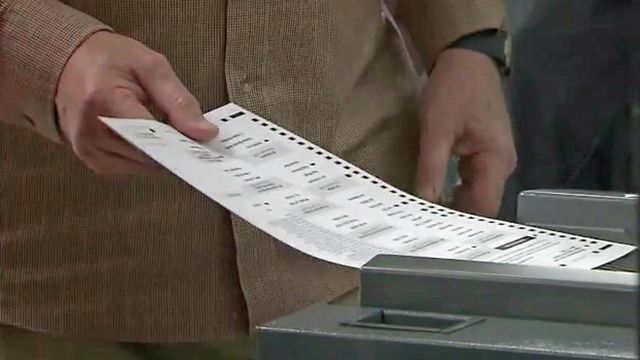Cooper veto overturned; 2018 judicial primaries canceled
Senate Bill 656 also eases ballot access for unaffiliated and third-party candidates and makes a number of other changes to state election law, including lowering the percentage of the vote candidates must meet to win a primary.
Posted — UpdatedSenate Bill 656 also eases ballot access for unaffiliated and third-party candidates and makes a number of other changes to state election laws, including lowering the percentage of the vote candidates must get to win a primary. It moves to 30 percent from 40 percent.
Asked why statewide primaries for the Court of Appeals and the Supreme Court are canceled in the bill as well, since they're not affected by redistricting, Lewis, R-Harnett, told Democrats they were welcome to propose a change on this when the General Assembly returns to session in January.
House Minority Leader Darren Jackson theorized that Republicans hope to boost Supreme Court Justice Barbara Jackson's re-election chances next year. Republicans were stung last year when Justice Robert Edmunds lost his re-election bid, Darren Jackson said, and the GOP legislative majority has since turned judicial races into partisan affairs again, identifying candidates by party on the ballot.
Now, Republicans want to cancel primaries, Darren Jackson said, in the hopes that Barbara Jackson will be the only Republican running against multiple Democrats.
Lewis said that wasn't a consideration and accused Democrats of "chasing ghosts."
"The legislature is angry that their bad laws continue to be overturned by the courts, and their solution to abolish a scheduled election and once again take away voters’ rights is wrong," Cooper said in a statement. "This is the first step toward a constitutional amendment that will rig the system by moving to partisan, legislative selection of judges. Allowing legislators to pick their own judges for political reasons is a bad idea."
In his veto message, Cooper also said he fears the canceled judicial primaries are a precursor to ending judicial elections altogether in favor of legislative appointments to the bench, something that would take a voter referendum to amend the state constitution. Chief Justice Mark Martin suggested the change this summer, and it has at least some support in the state Senate.
House Republicans have pushed for redistricting instead and point out no legislative appointments bill has been filed. Democrats said they expect one in January.
Lewis likened Cooper's concerns, and Darren Jackson's, to the outcry that rose up late last year as rumors swirled that Republicans would add two judges to the state Supreme Court in an effort to swing the court's majority back their way despite Edmunds' loss. The idea drew protests but was "never even discussed," Lewis said Tuesday.
But Republican legislators did move this year to cut the Court of Appeals from 15 judges to 12 as sitting judges retire, and the judges due to retire next are Republicans. The House's proposed new map for judicial elections would likely elect more Republican judges, based on voting trends and where the new lines are drawn. Republican supporters say they're addressing long-standing imbalances that favor Democrats, who were North Carolina's ruling party for a century, as well as correcting unfair population differences between districts.
Even critics of the new map, including legislative Democrats, have acknowledged a need for some changes to voting districts. But they have criticized the process, which went public in June when state Rep. Justin Burr, R-Stanly, tweeted out a proposed map and took the judiciary system by surprise. The decision to cancel judicial primaries also took people by surprise when leadership inserted it into Senate Bill 656.
"Four or five people made a decision, and the rest of us are spectators," Darren Jackson said Tuesday.
The Senate vote fell along party lines. The threshold to overturn vetoes is three-fifths of those present and voting.
• Credits
Copyright 2024 by Capitol Broadcasting Company. All rights reserved. This material may not be published, broadcast, rewritten or redistributed.






